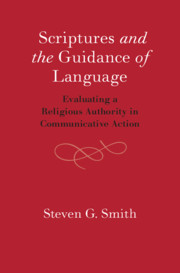Book contents
- Scriptures and the Guidance of Language
- Scriptures and the Guidance of Language
- Copyright page
- Contents
- Acknowledgments
- Part I Problematics of Communicative Action
- Introduction
- 1 The Guidance Problematic
- 2 The Speaking Problematic
- 3 The Writing Problematic
- 4 The Religious Language Problematic
- Part II Problematics of Scripture
- Concluding Thoughts on the Necessity of Guidance and Ideal Scripturalism
- Bibliography
- Index
3 - The Writing Problematic
from Part I - Problematics of Communicative Action
Published online by Cambridge University Press: 05 October 2018
- Scriptures and the Guidance of Language
- Scriptures and the Guidance of Language
- Copyright page
- Contents
- Acknowledgments
- Part I Problematics of Communicative Action
- Introduction
- 1 The Guidance Problematic
- 2 The Speaking Problematic
- 3 The Writing Problematic
- 4 The Religious Language Problematic
- Part II Problematics of Scripture
- Concluding Thoughts on the Necessity of Guidance and Ideal Scripturalism
- Bibliography
- Index
Summary
Information
- Type
- Chapter
- Information
- Scriptures and the Guidance of LanguageEvaluating a Religious Authority in Communicative Action, pp. 77 - 102Publisher: Cambridge University PressPrint publication year: 2018
